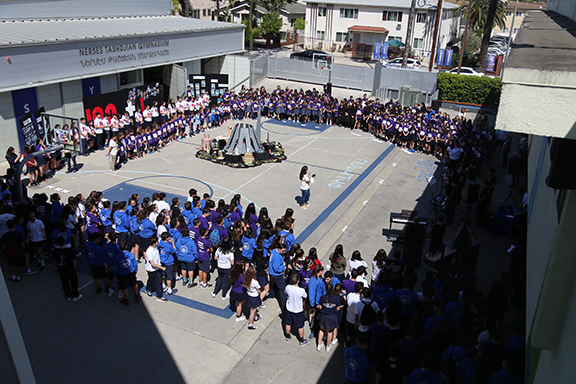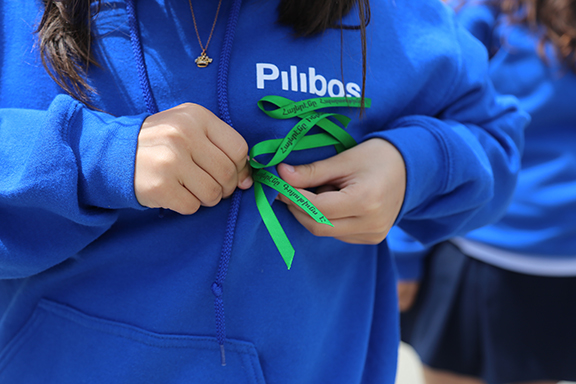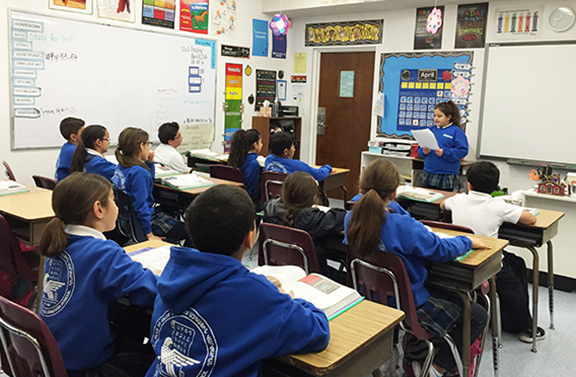Pilibos Students Pledge to Speak Armenian and Fight for Hye Tahd
May 20, 2016
This is Pilibos!
BY PATIL DER HOVAGIMIAN
Ambition: Motivation: Determination: Success: Spirit.
This is Pilibos!
An entire school day dedicated to exclusively speaking Armenian. Many doubted the will power of our students. Others questioned their potential.
Here, at Pilibos, our students are not just taught the Armenian language; they are exposed to its beauty and history.
Here, at Pilibos, our scholars do not only read Armenian literature; they live and breathe its authenticity.
Here, at Pilibos, our youth does not just acquire information about our past and our cause; they discover their roots and the influence they can have on its future.
Pilibos breeds Armenian spirited individuals who are driven to make a difference: youngsters who wholeheartedly sing in Armenian in preparation for a community event, individuals who collect supplies in order to send aid to our soldiers in Artsakh, students who diligently work to put together a program for their school to commemorate the memory of the lives we have lost and celebrate our triumphant existence.
Pilibos represents all things Armenian: spirit, culture, traditions, and education. We are the true depiction of what our forefathers sacrificed their lives for ”“ we are the future of the Armenian people.

A Pledge to Speak Armenian
BY ANITA TOKATYAN
Rose and Alex Pilibos’s Speak Armenian campaign initiated a motivating competition amongst students and faculty who were asked to speak Armenian throughout the day. The task proved challenging, finding ways to discuss English literature, math, science, art, and more in a language that for many is foreign in regard to those subjects. Yet the spark was lit””students eagerly ran around trying to capture ribbons from those who weren’t speaking Armenian; teachers engaged in conversations with students beyond their respective subject matters; and the immense desire to prove that the challenge could be met and won permeated the classroom.
The campaign boosted the bravado of the many already comfortable speaking the language across the curriculum, and broadened the possibility for those still uneasy applying it outside their Armenian classes. For most of us born in the Diaspora, English tends to be the default language when explaining a lesson or expressing an idea; but what we often forget is that Armenian was our first language. We forget that, for a time, the early years of our development consisted of speaking, listening, and thinking in Armenian. Though time, location, and circumstance may play a part in forcing us to predominantly use English, the Speak Armenian campaign was one opportunity to sustain our native language and our roots.
We would assume that the teachers are the most prepared for the challenge, and expect that some students would need much encouragement. But walking onto campus, having two students rush toward you fighting to pin your ribbon, and enduring a week-long demand from the student body for you to speak Armenian, puts into perspective how inherent speaking and thinking in Armenian truly is for our youth.

Pilibos Scholars Take the Lead!
BY MARIANNA AZIZIAN
On the morning of April 8th, as usual, teachers one by one were helping students enter the school’s gates, turning tired eyes and sleepy faces into bright smiles, it was Friday after all. However, this day was a bit different than the usual. At the gates, fellow students were anxiously waiting for their friends so they can place green ribbons on their school uniforms. With each ribbon, students promised to speak Armenian throughout the day, whether it was in the classroom, on the court, during lunch, or when talking to friends, they must express themselves in Armenian only.
Green ribbons spread throughout the campus and Armenian floated throughout the halls. The fun continued in the classroom where select students for every class, in every grade, were challenged to teach the lesson of the day in Armenian. The best part of the movement involved the teachers and students working together to remember scientific and mathematical terms in Armenian. Everyone, even the teachers, learned something new that day. Learning the parts and cycles of the volcano in Armenian was no easy task for the 6th grade students, but it was achieved! The 7th graders wrote poems in Armenian during creative writing and read them allowed for the class. Even students, who were reluctant to write, expressed themselves so passionately in Armenian. Thoughts seem to flow differently while writing with one’s mother tongue. In the end, students appreciated the density and richness of the Armenian language as they learned words they would not come across during a typical Armenian lesson.
Even though every day students read, speak, and think in Armenian, on this specific day, Pilibos students decided to take it further and have it ingrained into all aspects of their day. It became a part of their academic, social, personal, and emotional self. The author Ray Bradbury said, “You don’t have to burn books to destroy a culture. Just get people to stop reading them.”